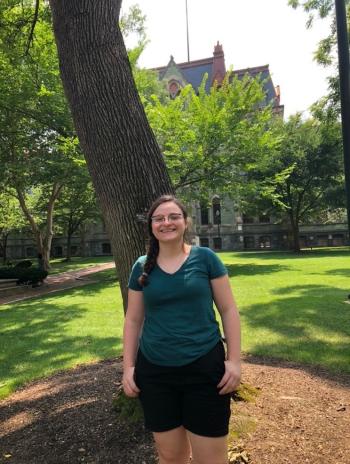
Name: Vanessa Shehu
Class Year: 2022
Major: Biochemistry and Molecular Biology
Hometown: Philadelphia, Pa.
Internship Organization: Perelman School of Medicine
Job Title: Research Intern
Location: Philadelphia, Pa.
Award: Betsy Zubrow Cohen 1963 Presidential Innovation Fund
What’s happening at your internship?
I am working with Dr. Abass Alavi, a physician-scientist in the Department of Radiology at Penn. When I first met with Dr. Alavi, I shared with him my family’s history with non-Hodgkin’s lymphoma. Upon gauging my interests and background, Dr. Alavi and the lab’s clinical research coordinator, Thomas, created a project for me to study a variety of lymphomas. My main project is to read, interpret, and take quantitative data from PET and PET-CT scans of lymphoma patients treated with CAR T-cell immunotherapy.
This summer, I have learned a great deal of anatomy while learning how to read scans. Using the medical imaging software ROVER and OsiriX MD, I assess PET and PET-CT scans from a group of approximately 60 patients. PET is a type of medical imaging that uses a radiotracer to image cancers. The predominant tracer used in clinic and research is 18F-flurodeoxyglucose (FDG), an analog of glucose which cancer cells take up due to their high glucose metabolism. One of my main challenges is to differentiate normal physiological uptake of FDG from uptake by cancerous lesions. For example, the liver, kidneys, and brain are organs that use a lot of glucose, so we would expect these organs to light up significantly on a PET scan. Fused images from PET-CT are especially remarkable because I am able to visualize other diseases such as atherosclerosis in the aorta, inflammatory bowel disease, and even renal stones in the kidneys.
Why did you apply for this internship?
I applied to work in the Alavi lab because I knew I would gain a wonderful mentor who works ceaselessly to advance science and to aid young people like myself in pursuing careers in biomedical research. Dr. Alavi is a pioneer in the field of molecular imaging. In fact, he conducted the first FDG-PET scan on a human being at Penn in the 1970s. Seldom do college students like myself come across the opportunity to learn from and receive the mentorship of pioneers like Dr. Alavi.
What are you learning at this internship?
I am learning a lot of anatomy by analyzing the PET and PET-CT scans. This has been a definite challenge because I did not have the intuition for some time to differentiate tumors from normal tissue, especially given that lymphoma is characterized by hematologic, non-solid malignancies.
In addition to interpreting scans and performing data analysis, I am learning to read medical and scientific literature. Dr. Alavi has tasked me and my lab partner, a fellow undergraduate who studies at Penn, to compose a literature review on PET imaging while we work on our main project.
I am also learning how to collaborate with others, face to face and remotely. I have noticed in the Alavi lab that learning is a group endeavor. Two medical students in the lab taught me how to use ROVER and OsiriX, one of whom met me virtually from across the globe in Asia! I, in turn, was tasked with providing a tutorial to a fellow student once I became proficient in these programs. This is quite remarkable to me, how interconnected our research is, and I believe it is the reason the Alavi lab achieves so much progress.
What is most rewarding about your internship?
Meeting so many brilliant, thoughtful, and welcoming people at Penn. Dr. Alavi’s lab demands a great deal of passion, commitment, and teamwork. I totally feel like a small fish in a big pond. It is exhilarating to be here! I spent a lot of time in the lab with my lab partner reading scans, taking data, and studying the literature. I have had meetings with some wonderful medical students in the Alavi lab, and even met with a fellow Bi-Co student in the Alavi lab! I also have become acquainted with physicists and biochemists in other labs in the Department of Radiology.
Perhaps the most exciting experience was one evening after my lab partner and I stayed late in the lab. A researcher in a neighboring MRI lab gave us a personal tour of his lab’s 7 Tesla MRI scanner. Amidst world class equipment, groundbreaking research, and powerful thinkers, I am simply overwhelmed and in awe!
Visit the Summer Internship Stories page to read more about student internship experiences.